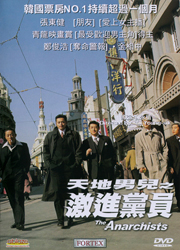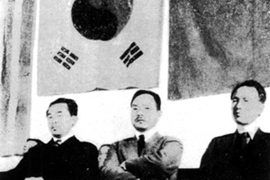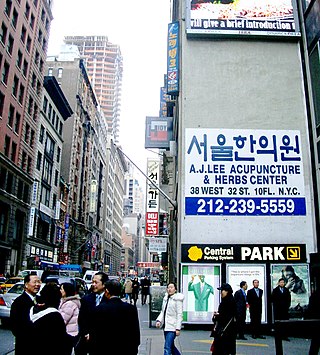Education

The Shanghai Korean School (SKS) is located in Shanghai.
| Part of a series on |
| Ethnicity in Shanghai |
|---|
As of 2019 about 56,864 (South) Koreans reside in Shanghai. [1] According to 2019 estimates about 79,609 Chaoxianzu (Joseonjok) (ethnic Koreans who are Chinese citizens) live in Shanghai. [2] South Koreans began moving to China after the 1992 establishment of diplomatic relations between South Korea and the People's Republic of China. Most South Koreans migrated to Shanghai due to business reasons. [3]
Hongqiao Town in Minhang District has the largest South Korean community in Shanghai and is considered to be the Koreatown of Shanghai.[ citation needed ] The Koreatown is located near Hongquan Lu (虹泉路) and Jinhui Nan Lu (金汇南路). [4] As of 2011, about 30,000 of the 50,000 Koreans in Shanghai live in the Koreatown area. [1]
In early 1919 there were 400 Koreans in Shanghai. In the autumn of 1919 this increased to 700. [5] In that era, Shanghai became a center of Korean nationalism. [6]
In 1982 there were 462 ethnic Koreans in Shanghai. This increased by 58.9% to 734 in 1990. [7] According to the State Ethnic Affairs Commission, from 1990 to 1995 the ethnic Korean population in Shanghai increased by 60%. [8]
As of 2003 there was an estimate of 7,500 long-term South Korean residents in Shanghai, with 2,676 of them having residential permits. [9]
By 2008 almost 23,000 Koreans resided in Shanghai, making up of 15% of the foreigners and making for the second largest migrant group in Shanghai. In addition Shanghai became the center of South Korean tourism to China. [10]

The Shanghai Korean School (SKS) is located in Shanghai.

Anarchists is a 2000 South Korean action film directed by Yoo Young-sik and co-written by Park Chan-wook. Set in Shanghai in 1924, the film is about the Heroic Corps: a covert cell of insurrectionist anarchists who attempt to overthrow the Japanese government's occupation of Korea through propaganda of the deed. Told from the perspective of the youngest member, Sang-gu, years after the fact, the story is a sympathetic look at a group of revolutionaries through the eyes of one of their own.

Koreatown, or K-Town, is an ethnic Korean enclave in Midtown Manhattan, New York City, centered on 32nd Street between Madison Avenue and the intersection with Sixth Avenue and Broadway, which is known as Greeley Square. The neighborhood in Midtown South features over 150 businesses of various types and sizes, ranging from small restaurants and beauty salons to large branches of Korean banking conglomerates. Koreatown, Manhattan, has become described as the "Korean Times Square" and has emerged as the international economic outpost for the Korean chaebol.

A Koreatown (Korean: 코리아타운), also known as a Little Korea or Little Seoul, is a Korean-dominated ethnic enclave within a city or metropolitan area outside the Korean Peninsula.

The Korean Provisional Government (KPG), formally the Provisional Government of the Republic of Korea, was a Korean government in exile based in China during the Japanese occupation of Korea.

The Korean diaspora consists of around 7.3 million people, both descendants of early emigrants from the Korean Peninsula, as well as more recent emigrants from Korea. Around 84.5% of overseas Koreans live in just five countries: China, the United States, Japan, Canada, and Uzbekistan. Other countries with greater than 0.5% Korean minorities include Brazil, Russia, Kazakhstan, Vietnam, the Philippines, and Indonesia. All these figures include both permanent migrants and sojourners.
Koreans in China include both ethnic Koreans with Chinese nationality and non-Chinese nationalities such as South Korean and North Korean people living in China. For this reason, ethnic Koreans with Chinese nationality or citizenship are termed Korean Chinese, Joseonjok, Chosŏnjok, and their official name in China is Chaoxianzu. They are the 13th largest officially-recognized ethnic minority group in China. Most of Korean Chinese live in Yanbian and Changbai within Jilin province. Significant populations can also be found in Heilongjiang, Liaoning, and Inner Mongolia Autonomous Region, with a sizable expat community in Shanghai. According to the South Korean government, the combined population of Koreans with Chinese nationality, South Korean, North Korean in China is 2,109,727 in 2023.
Koryo-saram or Koryoin are ethnic Koreans in the post-Soviet states who descend from Koreans who were living in the Russian Far East.
A recognizable community of Chinese people in Korea has existed since the 1880s, and are often known as Hwagyo. Over 90% of early Chinese migrants came from Shandong province on the east coast of China. These ethnic Chinese residents in Korea often held Republic of China and Korean citizenship. The Republic of China used to govern the entirety of China, but now only governs Taiwan and a minor part of Fujian province. Due to the conflation of Republic of China citizenship with Taiwanese identity in the modern era, these ethnic Chinese people in Korea or Hwagyo are now usually referred to as "Taiwanese". However, in reality most Hwagyo hold little to no ties with Taiwan.

The Communist Party of Korea was a communist party in Korea. It was founded during a secret meeting in Seoul in 1925. The Governor-General of Korea had banned communist and socialist parties under the Peace Preservation Law, so the party had to operate in a clandestine manner. The leaders of the party were Kim Yong-bom and Pak Hon-yong.
Korean Canadians are Canadian citizens of full or partial Korean ancestry, as well with immigrants from North and South Korea. As of 2016, Korean Canadians are the 8th largest group of Asian Canadians.

Parliamentary elections were held in North Korea on 25 August 1948 to elect the members of the 1st Supreme People's Assembly. Organised by the People's Committee of North Korea, the elections saw 572 deputies elected, of which 212 were from North Korea and 360 from South Korea.

The Republic of Korea participated in the 2010 Asian Games in Guangzhou, China on 12–27 November 2010.
East Asian people are the people from East Asia, which consists of China, Japan, Mongolia, North Korea, South Korea, and Taiwan. The total population of all countries within this region is estimated to be 1.677 billion and 21% of the world's population in 2020. However, large East Asian diasporas, such as the Chinese, Japanese, Korean, and Mongolian diasporas, as well as diasporas of other East Asian ethnic groups, mean that the 1.677 billion does not necessarily represent an accurate figure for the number of East Asian people worldwide.

Lyuh Woon-hyung or Yo Un-hyung was a Korean politician who argued that Korean independence was essential to world peace, and a reunification activist who struggled for the independent reunification of Korea following its national division in 1945.

As of the 2011 American Community Survey, New York City is home to 100,000 ethnic Koreans, with two-thirds living in the borough of Queens. On the other hand, the overall Greater New York combined statistical area enumerated 218,764 Korean American residents as of the 2010 United States Census, the second-largest population of Koreans in the United States outside of Korea and the most prominent.

Inside Men is a 2015 South Korean political action thriller film written and directed by Woo Min-ho based on Yoon Tae-ho's webtoon The Insiders that dissects the corruption within Korean society. Starring Lee Byung-hun, Cho Seung-woo and Baek Yoon-sik, it began filming in July 2014 and was released in theaters on November 19, 2015. Inside Men and the director's cut Inside Men: The Original have sold a total of 9.1 million admissions at the box office, thus becoming the top grossing R-rated movie of all-time at the Korean Box office.

The Korean National Revolutionary Party, or KNRP, was a nationalist party formed by exiles in Shanghai in 1935 to resist the Japanese occupation of Korea. At first it was the main nationalist Korean political party, but as the Sino-Japanese War (1937–45) progressed the rival Korean National Party, later Korea Independence Party, gained more influence with the Chinese Nationalist government in Chongqing and came to dominate the Korean Provisional Government. The KNRP of America was a significant factor as a source of funds and a link to the US government. The KNRP was dissolved in 1947.
The Korean Patriotic Organization (Korean: 한인애국단) was a militant organization under the Korean Provisional Government (KPG) and founded in Shanghai, China in 1931. It aimed to assassinate military and government leaders of the Empire of Japan. The group also went by the name Ŭisaenggun.

Hwang Sun-hui was a North Korean politician who served in several high-ranking positions in the Workers' Party of Korea (WPK), including in the Supreme People's Assembly and the Central Committee of the WPK. She was affiliated with the Korean Revolution Museum from 1965, and was its director from 1990.